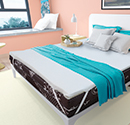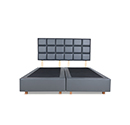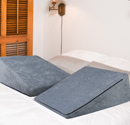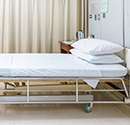What is sleep insomnia?
You may unfortunately know it too well. It is a chronic sleeping condition that can have a severe impact on our ability to stay focused and well rested. It is characterized by having difficulties falling asleep or staying asleep.
Sleep insomnia symptoms can include:
- Irritability
- General tiredness
- Problems with concentration
- Waking up often during the night
- Having difficulty falling asleep
- Waking up too early
According to researchers, there are varying intensities of insomnia; occasional to chronic. Insomnia is chronic if it occurs three nights per week for at least a month, acute if it occurs one to two nights per week, and occasional if it occurs less than that.
The effects can be far-reaching. For instance, getting enough good-quality sleep is essential to staying healthy and aging well. A lack of sleep can have serious consequences such as a higher risk of type 2 diabetes, obesity, heart disease, and other health conditions.
Causes of sleep insomnia
Normally, you will not realize you are suffering from sleep insomnia until it begins to take toll on your general body functionality and wellness. How did I end up here? This is one question that you might ask yourself as you lie awake at 3.00 am for no avowed reason. The following can be contributing factors:
- Stress
- Environmental factors (i.e. a cluttered room, noise, light, temperature)
- Pain
- A mattress with insufficient support
- Medications
- Diet
- Not exercising
- Too much screen time
- Inconsistent sleep schedule
- No bedtime routine
- Working too many hours
To beat insomnia, you can try these proven remedies.
1. Put yourself on a regular sleep schedule
A regular sleep schedule can help you to fall asleep and wake up more easily according to your desired patterns and schedules. As sleep experts, we recommend that if you go to bed at the same time each night and wake up at the same time each morning will ensure that your body adapts to a sleep routine that ensures maximum rest and recovery.
It is important to try and keep on your schedule, even on the weekends, so you don’t set yourself back. If you throw off your schedule every weekend, you will spend each following week trying to get back on schedule and just when you do; it will be the weekend again. This creates an endless loop of sleep problems.
2. Cut out foods and drinks that disrupt sleep
There are certain consumables known for their notoriety in sleep disruptions. They include caffeine, alcohol, high sugar foods and spicy foods. It is best to avoid these within six hours to your bedtime.
It’s important to note that caffeine is not just found in coffee, but in tea, chocolate, energy drinks, some energy bars, and fizzy drinks. It stimulates the body which makes it harder to get to sleep. Alcohol, on the other hand, is a depressant. Majority of people think one for the road can help them get to sleep. However, the reality is that it may knock you out initially, but within a few hours, as the body starts to eliminate the alcohol, it will wake you or, at best, cause a restless sleep.
3. Do more physical exercises
Exercises can help you sleep. Regular aerobic exercises helps you to fall asleep faster, wake less in the night, and get more restorative deep sleep. You can choose from exercises like running, walking, swimming, cycling, spin classes or anything that gets your heart rate up.
4. Be mindful of the impact of light
Light can disrupt your sleep because its flashes activate brain receptors that keep the brain active. It is recommended that all electronic equipment are turned off an hour before bed. These electronics include gadgets with display screens like computers, phones, and televisions. If you don’t, your brain may not shift into sleep mode because it still getting signals to stay awake.
5. Create a sleep-friendly environment for sleep
Practice the following basic tips to create a sleep inducing ambiance.
- Make your bedroom as dark as possible
- Keepy the bedroom clean and fresh
- Make sure the bed size and mattress is the right one
- Minimize noise
- Keep away any screens that have luminosity features.
It can be extremely frustrating to struggle with insomnia every night. However, by implementing these tips to induce and promote sleep, you can help yourself to get more rest. A large part of beating insomnia, in many cases, is developing better habits that make sleep a priority. The truth is, without proper sleep, we can not give our best during the day. It is worth the investment to commit to a few changes that will prove beneficial in your general wellbeing.
































